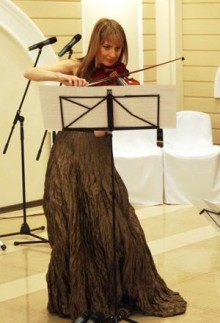The band marked its birthday without its founder, artistic director, and conductor, the recently deceased Bohodar Kotorovych. The anniversary concert took place at the National Philharmonic Society of Ukraine before the band’s official birth date (November 29), and was dedicated to the memory of the legendary maestro.
Dmytro Lohvyn now conducts Kyivski Solisty. The evening was held without any pomp, officials’ bombastic speeches, or other anniversary rhetoric, which is a bit unusual for this type of event. Moreover, it was the band’s first anniversary in the new, national format. And yet it was very symbolic, as Kotorovych did not fancy formalism.
The program was presented as a gala, a string of repertoire items where different band members took turns to perform their hits. Ihor Zavhorodnii, the last and youngest of Kotorovych’s pupils, got the most applause when he performed Henryk Wieniawski’s Polonaise in D major, in authorial arrangement for the violin and strings. The same went for the duet of Kyrylo Sharapov and Taras Yaropud, who were confident and at ease, seemingly effortlessly performing Niccolo Paganini’s Carnival of Venice. Of course, not all of the soloists were of the same level. Yet this approach, when each musician is entitled to perform solo, is also one of the traditions introduced by Kotorovych.
Kororovych essentially created Kyivski Solisty from his pupils, who make up most of the band.
“Kotorovych used to choose the best among us,” told Yaropud, the band’s current concertmaster. “So he would just say, with that simplicity and directness of his, ‘You will play in my band!’ Taking time to consider the offer, or declining it, would have been something quite unthinkable for us.”
According to Kotorovych’s colleagues, besides professional skills, he really valued a musician’s human qualities, such as integrity, openness (the maestro would awfully resent it when someone would do something behind his back, e.g., go abroad to perform or give master classes — in other words, build their career on their own, without his help), and he would not tolerate falsehood in relations.
Maybe, that is why he focused on sincerity and spontaneity in performance, rather than technicality and virtuosity. Indeed, the quality of performances was not always impeccable. But there was something which is perhaps more important: the pep, the liveliness, the passion, and at the same time some moving naivety and ingenuousness. This is what characterizes the music of the Romantic era (which prevails in the band’s repertoire), although “emotionality” here is not an absolute priority. However, struggling with my own criteria for the quality of music performance after yet another concert by Kyivski Solisty, I would often think: right they are.
Kotorovych would admit that he never listened to recorded music. Why did he say that? Of course, he was very well aware of the most outstanding versions of the pieces he would perform himself; as a music connoisseur, he was second to none. Yet Kotorovych was anxious not to copy or repeat anything that was already found by someone else. He always emphasized the originality of interpretation, and its individualization.
This reminds me of his somewhat romantic interpretation of the old masters’ opera within the unfinished cycle The Secrets of Ancient Folios, based on the materials of “Bach’s archives.” The maestro was not in the least troubled by the fact that such music implies using special baroque instruments, which Kyivski Solisty did not have. “We are playing it as we perceive and understand it today,” he would say. “For no one knows how they used to play it, how it should be.”
Likewise, classical “hits” performed by Kyivski Solisty, would take on a special hue. Justified or not (as was the case with Mozart’s Symphony No. 9, where they went a bit too far with the tempo), the spectators had no chances to remain indifferent and passive, and the inertness of listening would go away. Every concert, every piece played by Kyivski Solisty turned into an adventure, when you didn’t know what would come of it.
A distinct page in the band’s history is written by Myroslava Kotorovych, the late maestro’s daughter. Her works are always aesthetic, stylistically and conceptually organized, and often theatrical events, with direction, scenery, and costumes.
One of the most successful projects is The Necklace of Children’s Dreams, where the music minimalism of the program symbolized the idea of childhood and childlikeness.
The death of Kotorovych marked the end of an entire epoch in the history of Kyivski Solisty, conventionally saying, the band’s “childhood.” The present stage can be described as self-acknowledgment, starting with the understanding of themselves “without Kotorovych,” and ending with outside observations made by the band’s other, new conductor, Lohvyn. The maestro said that Kyivski Solisty had exceptionally high professional and artistic potential, but they had not been fully disclosed.
What was the implication? It can be interpreted in various ways. But according to musicians themselves, while they have been in Lohvyn’s charge, they have felt more discipline and organization in the music process. Also, the number of concerts has grown, their concert schedule has become busier. Then, there is the outer factor, albeit formal — the new “national” status of the band, which doubtlessly had long been overdue. In a word, Kyivski Solisty, just as the people, circumstances, and situations around them, are changing, and we are changing along with them.







